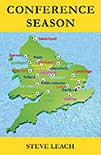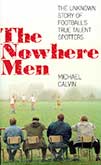 The art & psychology of the perfect penalty
The art & psychology of the perfect penalty
by Ben Lyttleton
Bantam Press, £14.99
Reviewed by Jonathan O’Brien
From WSC 333 November 2014
The glib explanation for the English fascination with penalties is because they lose so many shootouts and are thus mesmerised by the idea of actually being good at them, somewhat like a gormless youth trying to work out the secret of successfully conversing with an attractive woman. Of course, just as a confident man is likely to have more success in a nightclub than a self-conscious one, if they (by which I mean England players) spent less time thinking about penalties, they’d probably fare a little better at them.
Ben Lyttleton explores this theme at length in Twelve Yards, a book which covers much the same ground as Andrew Anthony’s 2000 effort On Penalties (though it’s roughly twice as long). His conversation with Ricardo Pereira, the former Portugal goalkeeper whose penalty saves knocked England out of two different tournaments, soon becomes a faintly farcical catalogue of neurosis, jittery body language and general mental collapse.
Ricardo – who memorably took off the gloves to save Darius Vassell’s effort at Euro 2004 and then blasted in the winner himself – describes Vassell as “very nervous” in the run-up, notes that Steven Gerrard couldn’t look him in the eye and claims that Jamie Carragher’s “mind was fucked up” when the defender took what transpired to be his team’s final penalty in Gelsenkirchen in 2006. He finishes by giving three simple tips to England penalty-takers: focus on the positive, don’t think about the media and forget about the history. One of these might be easier to execute than the other two.
Lyttleton’s scope is nothing if not wide. He travels to South America to interview two penalty-taking keepers, José Luis Chilavert and Rogério Ceni, who ended their careers with well over 100 goals between them. “I was always calm,” Chilavert tells him with no discernible sarcasm. “I was playing a role on the pitch… Look, I could hardly be the hero with this face!”
He meets up with Antonin Panenka, scorer of the most famous penalty ever, outside a village pub near Prague, and discovers that while the legendary midfielder is justifiably proud of the clever little chip which won Euro 76, he also feels it has overshadowed everything else in his long career. Panenka theorises that the main reason for his worldwide fame is because his name “sounds the same in any language”.
But at times, you can sense Lyttleton straining to reach the word count (the book may have had more impact at a shorter length). One entire chapter is a retelling of the France v West Germany match in Seville in 1982, translated directly from a feature in France Football – it’s a very good read, admittedly, but relatively little of it has anything to do with penalties. There’s also a small handful of very bad mistakes – to pick one at random, Spain’s legendary keeper in the 1930s was named Ricardo Zamora, not Schavio Zamora. But this is a readable study of an almost unknowable art, as long as you don’t mind stumbling over yet another graph or table of stats every ten pages or so.
 Moving to the NASL was a culture shock for many British pros in the 1970s – an extract from
Moving to the NASL was a culture shock for many British pros in the 1970s – an extract from  by Steve Leach
by Steve Leach A new owner usually brings promises of lavish spending but Charlton fans need only look at examples in Belgium to see how their club will be run, says
A new owner usually brings promises of lavish spending but Charlton fans need only look at examples in Belgium to see how their club will be run, says  The unknown story of football’s true talent spotters
The unknown story of football’s true talent spotters